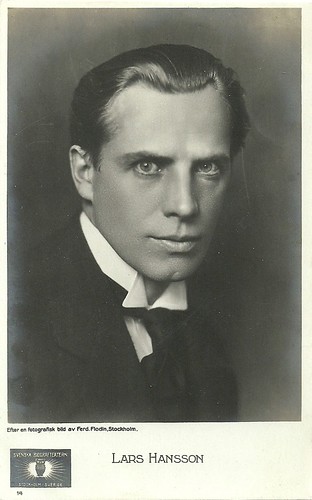
Swedish card by Svenska Biografteatern, no. 10. Photo: Ferd Flodin, Stockholm.
Snake Enchantress
Lili Beck in Copenhagen, Denmark in 1883 or 1885 (the sources differ). Her name is often spelt as "Lili Bech".
She received her artistic training in Copenhagen and made her stage debut in 1905 at the Folketeatret. In the same year, she went on tour with the small stage troupe of Jens Trap Walters. In 1910, Bech returned to the Folk Theatre, where she later scored a major success playing Delila in the ancient drama 'Samson and Delilah'. Her debut in the Danish cinema was in the film Morfinisten/The Morphine Takers (1911), directed by Louis Von Kohl and produced by Det Skandinavisk-Russiske Handelshus.
In the flourishing Danish film industry, Bech quickly made her career and advanced to one of the most famous screen actresses of her country. Already in her next film, Taifun/The Typhoon (Louis Von Kohl, 1911) she played the lead. After that Lili would play in four more films by the same company, including Alfred Lind's circus films Den flyvende Cirkus/The Flying Circus (1912) and Bjornetaemmern/The Bear Tamer (1912), in which she played a snake enchantress.
She was mostly seen in family dramas and social melodramas in which she was almost always given leading roles. In 1913 she moved to the Nordisk Film Kompagni where she played in three films by Robert Dinesen (all 1913) and one by August Blom (1914).
In 1913 it was rumoured that Lili Beck would go to the United States and work for the film company Vitagraph. Instead, she started to work for the Swedish company Svenska Biograftheatren.

Lars Hanson. Swedish postcard by Svenska Biografteatern, Stockholm, no. 14. Photo: Ferd. Flodin, Stockholm. Hanson's last name is spelled Hansson on this card.
Sjöström and Stiller
Lili Beck was married shortly to Erik Magnusson in 1912. She remarried Swedish film director Victor Sjöström, in whose debut Trädgardsmästeren/The Gardener (1912) she played opposite Sjöström himself and Gösta Ekman. It was her first Swedish film and Beck would henceforth pursue her career there. Between 1912 and 1916, Lili Beck played in nine films by Sjöström.
Beck also performed in eleven films by director Mauritz Stiller, the discoverer of Greta Garbo. These films include Vampyren/The Vampire (1913) and Vingarne/The Wings (1916), based on Herman Bang's 1902 novel Mikaël.
Vingarne was a very early gay-themed film. The story is that of a conniving countess (played by Lili Beck) coming between a gay sculptor, Claude Zoret (Egil Eide), and his bisexual model and lover, Mikaël (Lars Hanson). The film is also notable for its innovative use of a framing story and telling the plot primarily through the use of flashbacks.
In 1916 she divorced Victor Sjöström. Lili returned to Denmark. With the decline of the Danish cinema after the end of the First World War in 1918 Lili Bech also hardly appeared in front of the camera and concentrated on her stage work again. She remarried for the third time to Danish stage and film actor Hakon Ahnfelt-Ronne. In 1920 she had her comeback as a film actress at the Nordisk company, where she would play in three films by Holger Madsen between 1920 and 1925, and after that in three films by August Blom. She married a fourth time to Martellius Lundquist, whom she divorced in 1933. Lili Beck died in 1939 in Århus, Denmark, aged 53 or 55.
In 1941, a fire in the archives of the Svenska Filmindustri destroyed the negatives and other related material of many of the Swedish films in which Lili Beck starred. Vingarne (1916) was one of the destroyed films. With a script and frame prints on paper film historian Gösta Werner reconstructed the shape of the film and when in 1987 a copy of the central part of the film was found in Oslo, it was possible to reconstruct the film. This version was premiered at the Swedish Film Institute in 1987.

Victor Sjöström. Swedish postcard by Svenska Biografteatern, no. 12. Photo: Ferd. Flodin, Stockholm.
Source: Det Danske Filminstitut (Danish), Richard Dyer/Julianne Pidduck (Now You See It), Wikipedia and IMDb.
This post was last updated on 16 July 2022.
No comments:
Post a Comment